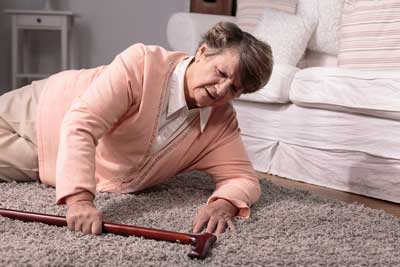Amie Clark, co-founder and frequent contributor to TheSeniorList.com, has had the privledge of working with seniors throughout her social work career in the areas of senior housing and care coordination.
Here she discusses some of her favorite things about TheSeniorList.com and shares ideas on navigating the process of finding long-term care for seniors. Read on:
Tell us about The Senior List. What spurred you to create the site?
The Senior List was created to help families and caregivers navigate the issues and challenges of senior care. We explore everything from Alzheimer's/dementia, medical alert systems, tech for the home, caregiving tips, senior discounts, senior housing and many other boomer/senior related topics.
Expert Interview Series: Amie Clark of The Senior List on Long-Term Care for Seniors
[fa icon="calendar'] Aug 16, 2016 9:00:00 AM / by First Choice posted in Senior Care, Caregiver, Expert Interview
5 Tricks Senior Care Providers Use to Avoid Stress & Stay Positive
[fa icon="calendar'] Aug 8, 2016 2:29:32 PM / by First Choice posted in In-Home Health Care, Senior Care, Caregiver, Professional Caregiver
In some cases, professional caregivers may also encounter significant resistance from a patient who is having trouble adjusting to his or her changed circumstances. Occasionally, this resistance manifests itself in the form of anger or irritability displayed inappropriately toward the caregiver. This, too, can be stressful.
Help with Senior Care Means You Can Have More Quality Time with Your Loved One
[fa icon="calendar'] Jul 29, 2016 10:00:00 AM / by First Choice posted in In-Home Health Care, Senior Care, Questions
Becoming the primary caregiver for a loved one whose physical or mental health is declining is more than just a challenging job. It is a series of challenging jobs.
You may find yourself on any given day handling transportation to and from medical appointments, helping your parent keep track of a complicated drug regimen, cleaning your parent's home, preparing meals for your loved one, and helping him or her with other activities of daily life. All of these are necessary activities, and are added to the responsibilities you already have for your own household.
In-Home Senior Care Can Help Your Loved One Avoid Social Isolation
[fa icon="calendar'] Jul 22, 2016 8:30:00 AM / by First Choice posted in Aging, Senior Care, Keeping Active
Social isolation, defined loosely as the absence of social interactions, contacts, and relationships with friends and family, with neighbors, or with society at large, is a serious issue for many older adults.
Andrew Steptoe, lead researcher of a study on the effects of social isolation on health outcomes among the elderly, states: "Social contact is a fundamental aspect of human existence. The scientific evidence is that being socially isolated is probably bad for your health, and may lead to the development of serious illness and a reduced life span."
The study found that the most socially isolated subjects had a 26 percent greater risk of dying than their socially connected counterparts, even when sex, age, and other factors commonly linked to survival were taken into account.
Warning Signs That Your Loved One Could Benefit from Home Health Care
[fa icon="calendar'] Jul 13, 2016 9:30:00 AM / by First Choice posted in In-Home Health Care, Senior Care, Caregiver
Life's transitional moments have a way of sneaking up on you. While your loved one may seem perfectly fine living independently one moment, in a short time, that can change. For many family caregivers, the difficulty is in seeing exactly when that change occurs.
Unless there is a particular precipitating event, like a debilitating illness or injury, the changes that occur are often so subtle that they go undetected for a time by even the most caring of family members. Added to that, many seniors try to mask the difficulties they are having performing activities of daily living on their own in an attempt to spare their caregivers from anxiety.
Here, then, are some signs that can help you detect when it is time to find support for your loved one with home health care services:
Homecare Can Relieve You of Worries About Wandering Behaviors in Your Senior
[fa icon="calendar'] Jun 9, 2016 6:00:00 PM / by First Choice posted in In-Home Health Care, Aging, Senior Care
According to the Alzheimer's Association, six in 10 people with dementia will wander. Wandering can occur at any stage of the disease, making it necessary for caregivers to take precautions to both reduce the likelihood of wandering behaviors and handle wandering incidents correctly if they should occur.
Why Dementia Patients Wander
Dementia patients can wander for a variety of reasons. The Mayo Clinic lists several common triggers for wandering. They include:
- Stress or fear: Some dementia patients experience stress or fear in unfamiliar surroundings, or in places where overstimulation of their senses occur (ie. loud noises or overly bright lighting).
- Searching: In many cases, dementia patients may be searching for an item they have lost, and wander away from a safe environment before they are aware of doing so.
- Boredom: Occasionally, a dementia patient may wander in search of something new to do or see.
- Attempting to care for a basic need: A dementia patient may be trying to care for a basic need like finding a bathroom or finding something to eat when he or she becomes confused and begins to wander.
- Following a past routine: In some instances, a dementia patient may be trying to go to a place or activity with which he or she is familiar (ie. going to a previous job or favorite store).
Home Healthcare and Successful Aging in Place
[fa icon="calendar'] May 25, 2016 7:30:00 AM / by First Choice posted in In-Home Health Care, Aging, Senior Care
More than 90 percent of older adults would prefer to age in place rather than move to senior housing, according to the National Aging in Place Council (NAIPC).
While retirement communities and assisted living facilities use the term "aging in place" to signify moving into a senior living community which offers the option of moving from one level of care to another within the community, the Centers for Disease Control and Prevention (CDC) notes that at its most basic, aging in place refers to "the ability to live in one's own home and community safely, independently, and comfortably, regardless of age, income, or ability level."
In Home Healthcare Helps Alzheimer's Patients Remain Independent Longer
[fa icon="calendar'] May 11, 2016 7:30:00 AM / by First Choice posted in In-Home Health Care, Aging, Senior Care
Caring for someone you love who suffers from Alzheimer's is a difficult and sometimes heartbreaking task. Yet, for many caregivers and care recipients dealing with this issue, the thought of moving a loved one from a home he or she has loved for many years is undesirable. What can you do to help your senior stay at home as long as possible, while still ensuring a high quality of care?
Making the Home Environment Safe
In order to ensure the safety of your loved one, it is essential to consider the home environment in which he or she lives. Are there areas of the home that will be unsafe as memory loss or dementia increases?
Providing Care To Your Family Member: A Rewarding and Challenging Task
[fa icon="calendar'] Mar 24, 2016 7:29:16 AM / by First Choice posted in In-Home Health Care, Senior Care, Caregiver
If you are caring for a parent, child, or sibling who is sick or disabled, you are providing caregiving services. There are several forms of caregiving ranging from formal to informal, and many family members do not consider themselves caretakers when they are helping a loved one. The position can be short term or long term, but either way, the demand for care can become overwhelming and stressful for the caregiver.









